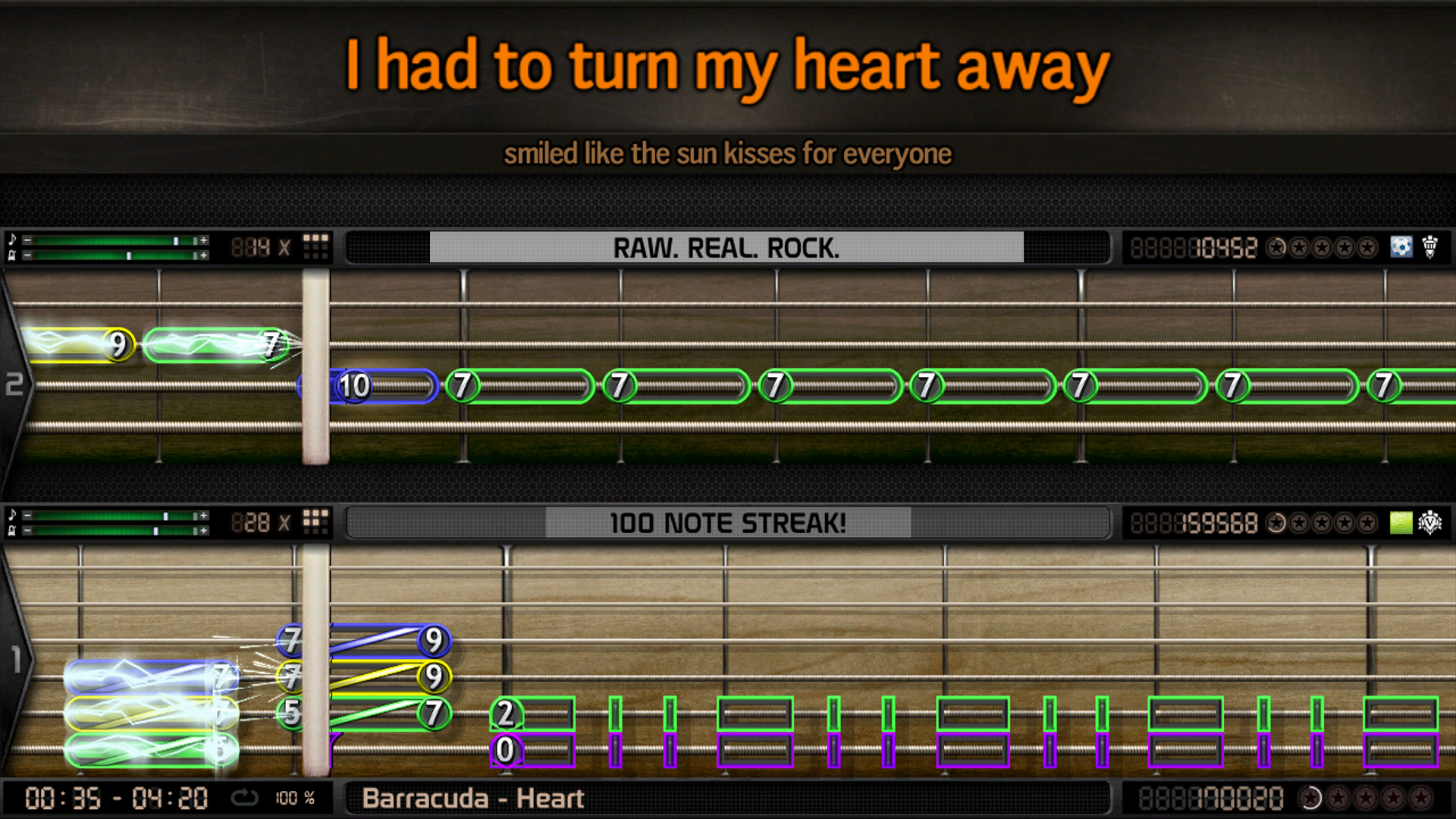12DOVE Verdict
Pros
- +
Amazing
- +
latency-free guitar tech
- +
Simple
- +
intuitive gameplay interface
- +
Multiplayer that will rekindle your best Rock Band memories
Cons
- -
Missing elegant features introduced in Rocksmith 2014
- -
Rough
- -
discouraging difficulty curve
Why you can trust 12DOVE
BandFuse: Rock Legends has some amazing technology backing it up. It’s immediately apparent upon starting the game for the first time. You plug in any guitar or bass with a ¼” jack, and it plays back with a tone crisp enough to convince you it’s coming out of a high-end amplifier, with zero latency. It fills your head with possibilities. For a reasonably undiscerning new musician, software like this could negate the need for expensive guitar equipment, since the virtualized amplifiers will make even a cheap instrument sound great. On top of that, the core gameplay--think Guitar Hero, but for real--never misses a note. But as you dig in, you’ll start to uncover some serious flaws in BandFuse’s approach, as well as its execution. And beyond those structural issues, BandFuse has another major problem, and it’s called Rocksmith 2014.
But since I’m reviewing BandFuse, and not Rocksmith, I’ll set that game aside for a moment. BandFuse is a rock rhythm game with an admirable and unique premise. It focuses its gaze squarely on the folks who criticized Rock Band and Guitar Hero (remember those?) for being “fake” and “easy” and asks them to put their money where their mouths are. That’s because on the hardest difficulty setting, BandFuse presents actual songs to note-perfect fidelity, requiring mastery-level guitar skill. And even on the easier settings, you’re still playing pieces of the songs, at least keeping your hands in the right place on the fretboard and plucking the right strings. And it all works--hearing your guitar sound come out of the speaker alongside the track and being rewarded in gameplay terms for it always feels magical. But there is a fundamental problem with making a game like this: A guitar isn’t a video game controller that can easily be understood and mastered.
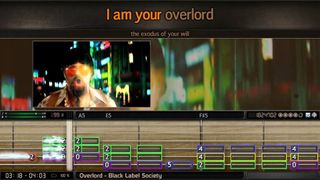
And here’s where I can’t ignore Rocksmith 2014: That recent, strikingly similar game solved that very problem by providing everything the player needed to wrangle the arcane device, and ease them into the experience. Now, while they both provide similar experiences with dropping a real guitar into familiar rhythm-game trappings, the two games do have different philosophies. Where Rocksmith is a teaching tool first, BandFuse relishes its video game status. It feeds off of the same part of your brain that all traditional rhythm games tap into, relying on your desire to excel and improve in the context of the game, for the sake of the game. BandFuse is a fun toy that lets you make use of your existing guitar skill, but it’s not a great tool to improve it.
That’s not to say it shuns beginners. Even the most inexperienced guitarist will be able to fumble through the game’s impressive 55-track set list on the easiest setting and have a good time doing it, partly because BandFuse mercifully doesn’t fail the player out of a song for poor performance. The gameplay interface and note-charts, though bland, are effective enough at communicating what you need to be doing. And it will inspire a vague-but-thrilling sense that you’re actually playing a song. But the game doesn’t provide the clearest path at how to improve. That same beginner might eventually master those songs on the easy difficulty setting, but cranking up the challenge will result in unbridled frustration, as the game simply expects you to have picked up the fundamentals along the way.
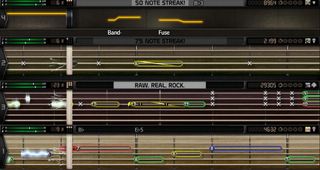
As a guitarist firmly situated in the “intermediate” category, with a strong grasp of the basics but an embarrassing deficiency of more advanced techniques, I had a particularly hard time getting the porridge just right in BandFuse. See, reducing the difficulty of a song simplifies all parts of it, regardless of the complexity of the individual sections. I found that, over the course of a single track, I’d glaze over with boredom during easier sections while guitar solos would completely overwhelm me. And if I didn’t already know how to play a song, playing it on the hardest difficulty was, unsurprisingly, a practical impossibility. Further compounding those issues, changing the difficulty mid-song requires restarting, so I often felt a discouraging frustration that made me want to put the game down and stick with online guitar tablature.
The difficulty progression is anything but smooth, but BandFuse doesn’t completely leave your guitar ambition out to dry. A dedicated teaching mode dubbed “Shred U” includes a suite of tutorials and tools that are intended to impart guitar technique and skill. Some tutorials are interactive, and others are simple videos hosted by the game’s “Rock Legends,” like Slash and Zakk Wylde. There’s also a mode called “Lick Lab,” which lets you take any of the songs and break it down to its individual parts, repeating them until you get them down. But those video tutorials don’t feel particularly vital, and both the interactive tutorials and the Lick Lab tend to rush you at an uncomfortable pace. I often felt like I was fudging my way through them without getting an actual grasp of the technique or the riff, with the game eager to tell me I did fine and move on.
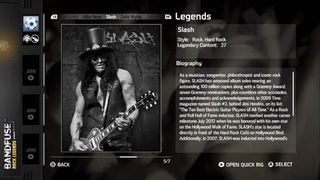
Aside from the technology, there is one gameplay element that BandFuse absolutely excels at. It supports multiplayer with up to four players, allowing you to gather different combinations of guitarists, bassists, and vocalists and jam out together. At its best, the multiplayer recalls the party atmosphere of Rock Band, and alleviates the more frustrating aspects of the game, if only temporarily. But given the absurd amount of equipment required to enjoy this feature, it’s tough to seriously recommend.
Actually, BandFuse is tough to recommend all-around. Were it to exist in a vacuum, it would be able to ride on its shockingly effective tech, novel premise, and varied song list. But with an elegant solution to BandFuse’s every stumbling block, Rocksmith 2014 provides all that BandFuse does and more. And given the amount of investment required for both, it just doesn’t make sense to settle for the lesser product.
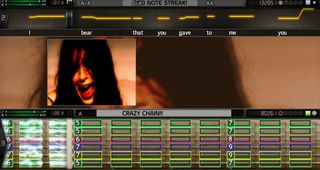
BandFuse: Rock Legends is a game with the technology to back up its great premise, but its flawed execution makes it a tough sell in light of its direct competition, Rocksmith 2014.
This game was reviewed on Xbox 360.
More info
| Genre | Rhythm |
| Description | BandFuse: Rock Legends seamlessly connects real guitars, basses and microphones to game consoles, empowering players to jam to a huge selection of hits in a fun game environment. |
| Platform | "Xbox 360","PS3" |
| US censor rating | "Teen","Teen" |
| UK censor rating | "","" |
| Release date | 1 January 1970 (US), 1 January 1970 (UK) |

Keanu Reeves is returning for John Wick 5 as the franchise expands with an anime prequel series and a Caine spin-off movie

Ex Nintendo PR managers say the Switch 2 generation is likely to see the retirement of "several of the major developers at Nintendo who we have known for 40 something years"
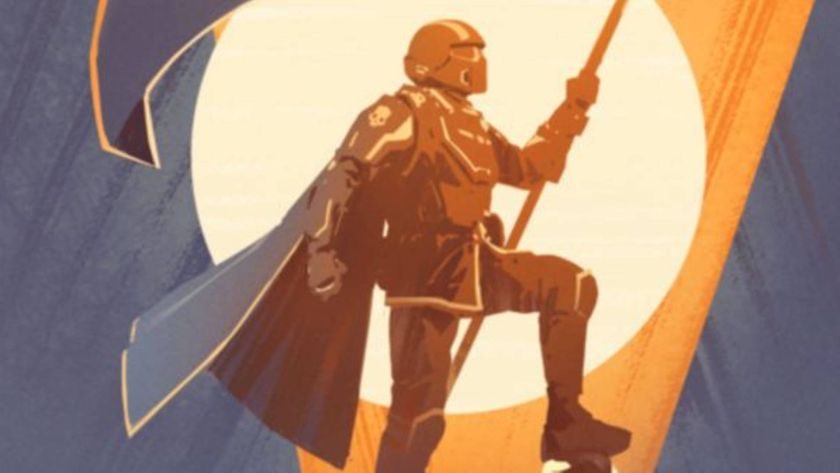
Helldivers 2 CEO says industry layoffs have seen "very little accountability" from executives who "let go of one third of the company because you made stupid decisions"
